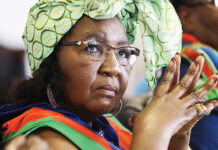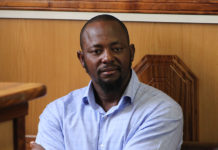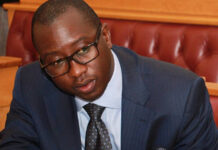By Tileni Mongudhi | 3 December 2021
TWENTY-TWO years ago, Bernhard Esau had a decision to make.
Some in Swapo felt disillusioned, particularly with Sam Nujoma’s attempt to get a third term as president. Old allies in the trade unions felt sidelined.
They wanted to break away to form the Congress of Democrats (CoD), and they wanted Esau to join them. With good reason.
During the 1980s, Esau worked his way up the ranks of the Mine Workers Union (MUN), then a tough-talking labour body connected to Swapo.
After independence, he led the National Union of Namibian Workers (NUNW), which opened doors to Swapo’s central committee, politburo, and later the Cabinet.
So in 1999, Esau needed to decide: act on principle, or keep his cushy, if somewhat inconsequential Cabinet post with all the perks that went with it.
“Like myself, my brother Esau was also deeply worried about the destructive course Swapo was on at the time,” Ignatius Shixwameni, the late leader of the All People’s Party (APP) told The Namibian last year.
“From tribalism, corruption, and of course the third-term plan, we decided, during one of our many meetings at his house in Hochland Park, that we cannot be part of such an institution.
“Just days before our announcement, Esau had a change of heart and rescinded his initial decision to join the CoD. He was primarily worried about his pension and how he would take care of his family.”
If his goals were financial, Esau made the right call.
In 2011, he became the minister of fisheries and marine resources, which gave him control over Namibia’s N$10 billion fishing industry. His riches grew to around N$23 million.
He was even floated as a presidential contender to succeed president Hage Geingob.
Now he’s at risk of losing his pension after two years in prison awaiting trial over the Fishrot scandal.
He faces 21 charges, including corruption, money laundering, and being part of a criminal syndicate.
SURVIVAL OF THE FITTEST
Esau’s decision to snub the CoD coincided with a major Cabinet reshuffle by Nujoma.
In March 1999, as the new party was founded, Nujoma decided to include trade unionists Esau and Walter Kemba as deputy ministers of trade and labour.
Esau allegedly used the pending formation of the CoD to muscle his way into Cabinet, threatening a further exodus unless he was included.
The unions were appeased, but Esau cut a lonely figure at the ministry of trade, excluded from important decisions.
He was often seen aimlessly loitering around the ministry’s corridors.
But as he weathered repeated storms, many unionists started seeing him as someone on the road to the party’s vice presidency.
‘KOLLETJIE’
In many ways, Esau’s story is part of the tale of liberation movements. Well-intended leaders rise from humble roots only to stumble when they reach the peak of their political careers, unable to resist the rich fruit that comes within their grasp.
Bernhard Martin Esau was born on 9 December 1957 at Swakopmund.
His father was Philipus Shivute, a migrant worker from Omatale, Ontananga, in the Oshikoto region.
The oldest child of three, Esau’s family called him ‘Kolletjie’.
His mother, Sussie Esau, had pet names for all her children.
Esau’s siblings were known as ‘Sustertjie’ (little sister) and ‘Broertjie’ (little brother).
“Everyone loved him, he had no enemies,” a source, who grew up at Swakopmund and knew the family, says.
Esau attended what was known as the inboorling (‘native’) school.
That was before he went to St Joseph’s Training College (Döbra) near Windhoek. After that, he headed to South Africa to study commerce at Fort Hare University.
The young Esau was also into football. In his early days he played for the neighbourhood team, called ‘Brazil’, but was later recruited by big clubs like Blue Boys and Atlantic Chiefs.
At Swakopmund, he was respected, especially for his charitable work. He helped elders pay their bills, and when he started working as a mine procurement officer he pushed for better conditions for workers. That’s when he became active in Swapo.
“During our time at the unions, Esau hated the manner in which mines and other big businesses were exploiting their workers,” a source who worked closely with him says.
“Esau would always urge us to stand on the side of workers and never sell out our comrades,” the source says.
Back then, Esau refused to live beyond his means, and struggled to even make small renovations to his Hochland Park house.
Evilastus Kaaronda, who worked with Esau during his time as NUNW secretary general, says: “It’s clear the Esau we know is not the same person who was arrested on allegations of bribery and corruption. These are two different guys.”
Kaaronda says the Esau he knew during his union days “wasn’t ready to sell his soul for money”.
After buying a farm around 2004, thanks to Agribank’s affirmative action loan scheme, it took more than 10 years before he could start making improvements.
He’d grown up at the coast, where he saw how Namibians never benefited from the ocean.
“Those early days he was so accommodating and accessible. He would even allow people to meet him at his house after hours,” a source says.
At first, his fisheries reform agenda appeared to be genuine.
Esau found an industry dominated by Spanish and multinational cliques. He vowed to open up fisheries to Namibians.
Ministry officials at the time recall that he was outraged at the fact that ordinary Namibians would never get to eat the lobsters, crabs, oysters, and salmon international companies exported.
BIRDS OF A FEATHER
Esau, a father of four, married Swamma Mbulu in the mid-1980s.
His daughter Ndapandula met Tamson ‘Fitty’ Hatuikulipi at Centaurus High School in Windhoek. They started dating around 2001, just before she went to study marketing in Cape Town.
Fitty’s business dealings at the time were informal and focused on gambling machines.
But after marrying Ndapandula, Fitty became a fixer for fishing companies.
A month after the wedding, Fitty met with Jóhannes Stefánsson at the Hilton Hotel in Windhoek. Stefánsson was an executive at Samherji, an Icelandic seafood company that became one of the biggest beneficiaries of the fishing industry Esau was regulating.
At their very first meeting, Fitty showed him a photograph of himself with Ndapandula.
Fitty emerged as a key player in helping Samherji get more fishing quotas – around N$2,5 billion – from his father-in-law.
Stefánsson later turned whistleblower.
In the meantime, one of Fitty’s companies was paid N$2,5 million by a fishing company – just the start for a man whose riches increased to more than N$52 million within 10 years.
But the real movers appeared to be Tamson’s cousin James Hatuikulipi and his friend Sacky Shanghala.
“Esau was never pompous, nor was he materialistic until he met those two, [James] Hatuikulipi and Sacky Shanghala,” a former friend says.
In the Ovambo culture, a bride’s parents are not allowed to attend the wedding reception at the groom’s home. But James Hatuikulipi and Shanghala allegedly smuggled Esau into the Hatuikulipi homestead at Engela so the minister would not miss the party.
“The Esau I knew would not bend the rules like that,” the former friend says.
Another source says Shanghala and Hatuikulipi started buttering up Esau, especially in public, often calling him ‘Grootman’ (Big Man).
A Swakopmund associate says in 2017 they realised something changed.
Many close family members and friends were not invited to Esau’s 60th birthday party, organised by Shanghala and Hatuikulipi, at a lodge near Otavi.
Later, expensive revamps were carried out on his farm, while his Hochland Park house was both remodelled and furnished with imported furniture.
The Anti-Corruption Commission (ACC) has said renovations to Esau’s lavish Farm Dakota were paid for in cash. He allegedly paid a contractor more than N$600 000 for the work.
The building materials were also bought in cash at stores in Windhoek by his wife.
The state says Esau received at least N$150 000 in his personal bank accounts from parties of interest, which were funded through a payment from Mermaria Seafood Namibia.
He also received an additional N$1,9 million through his corporate and business interests, which received funds from parties of interest.
A financial analysis found that Esau benefited from an additional N$3,3 million through payments related to expenses on his farm Dakota.
FISHCOR CAPTURED
Fishcor is key to understanding Esau’s role in the Fishrot corruption scandal. The national fishing company started in 1991 to give the state a stake in the fishing sector. It had been on the verge of bankruptcy.
Esau and his inner circle saw an opportunity to benefit from the Fishcor reforms.
Esau’s team, including Shanghala and Hatuikulipi, targeted one of the biggest players in the fishing industry, Namsov – a consortium co-owned by some Namibians and South Africa’s Bidvest.
Esau started turning the screws, massively reducing Namsov’s annual fishing quotas from 65 000 to 33 600 tonnes.
In December 2013, Namsov sued Esau, which he saw as a declaration of war.
To execute their scheme, Esau needed an entity to which he could divert fishing quotas: Fishcor.
In 2014, Esau appointed James Hatuikulipi as Fishcor’s chairperson. The following year, he appointed his personal assistant, Ndaendomwenyo Sheya, to the Fishcor board.
Then Esau and Hatuikulipi hand-picked Mike Nghipunya, a deputy director in the fisheries ministry, as Fishcor’s chief executive, with a salary of N$1,5 million a year.
Former deputy fisheries minister Samuel Ankama felt Nghipunya did not meet the requirements for the position.
“He was hand-picked. I like questioning things, and I guess my colleague (Esau) didn’t like that,” Ankama says.
“I warned Nghipunya that he was being used by Esau,” he says.
Ankama was later sacked.
‘ESAU KILLED US’
In December 2014, judge Shafimana Uitele found that Esau acted unlawfully when he diverted fishing quotas from Namsov to Fishcor.
But that bruising court ruling didn’t stop him.
In 2015, Esau and Shanghala changed the fisheries law to bypass the ruling, allowing him to use Fishcor as a conduit to enrich his cronies and son-in-law.
Statistics show Esau handed horse mackerel quotas to Fishcor, valued at about N$900 million from 2014 to 2019.
In the midst of it all, Esau was facing another challenge: Around 1 250 fishermen downed tools that year, demanding better working conditions and salaries.
Esau was unshaken.
“They must go back to work, before they increase unemployment,” he said at the time.
The results were brutal. Some returned to work, but those who refused to budge lost their jobs.
According to their union, 29 fishermen died as a result of being jobless, while others suffered “untold hardship” as they could not provide for their families.
“Esau killed us,” chairman of the Namibian Fisherman United Association, Mathew Lungameni charged.
The job losses did not stop Esau’s inner circle from hatching a new plan to line their pockets.
In 2016, Esau endorsed a scheme to donate fish to Angola. It resulted in Namibia and Angola signing a memorandum of understanding, with Esau inking the deal on behalf of Namibia.
The 50 000 tonne quota, worth around N$150 million, never reached Angola. Instead, it was allocated to Esau’s allies, including James Hatuikulipi, Ricardo Gustavo, and Shanghala.
The N$150 million worth of fish was handed to a company that, according to the state, did not exist and employed only one person: Gustavo.
Gustavo claims the company was owned by José de Barros, the son of former Angolan fisheries minister Victória de Barros Neto, who signed the bilateral agreement with Esau.
MONEY AT ALL COSTS
Esau also ignored his own scientists and pushed ahead with pilchard quotas, a species declared as ‘depleted’, and in danger of extinction in Namibian waters.
He downplayed scientific research showing that pilchards had been overfished and that the stocks may not recover, even if a five-year ban was put in place.
2017 was a special year for Esau.
It was a Swapo congress year with the ruling party set to vote for its top leadership.
Fishcor, under Esau, was used to transfer N$98 million meant for poverty alleviation programmes to law firms owned by lawyers Marén de Klerk (N$75 million) and Sisa Namandje (N$22,5 million), partly to fund president Hage Geingob’s presidential campaign.
However, most of the spoils were shared by Fitty, James Hatuikulipi, Shanghala, and Nghipunya.
Court papers show that some money was used to renovate Esau’s farm, and to acquire a N$1,7 million plot at Otjiwarongo.
Esau’s political currency grew massively in the wake of the congress.
That same year, he also endorsed another dodgy fishing deal – a joint venture co-owned by Fishcor, called Seaflower Pelagic Processing. Businessman Adriaan Louw owned the majority of the company.
The national fishing company would own 40% of Seaflower, while a company called African Selection Fishing Namibia would own 60%.
The devil was in the details.
Taxpayers had to foot the bill for this questionable deal through Fishcor, which poured close to N$700 million in start-up capital and loan guarantees into the joint venture.
A report said Fishcor diverted quotas allocated to Seaflower Pelagic Processing (SPP) worth around N$175 million to Samherji – the company represented by Esau’s son-in-law.
Judge Hosea Angula described the company’s relationship with Fishcor as “cosy” and “parasitic”.
‘DAYLIGHT ROBBERY’
Esau is named as a key enabler of the Fishrot corruption scandal. Without him, the N$2,5 billion corruption scheme may not have been possible.
Along the way, he did not fear taking on business deals that threatened his turf, such as phosphate seabed mining.
Esau and Shanghala stood side by side and rebuffed the phosphate plan pushed by business fixer Knowledge Katti.
A sting operation by news network Al Jazeera exposed Esau soliciting bribes. In the documentary, Esau explained how a prospective company could allegedly channel money through law firms to benefit Swapo.
Esau was arrested on 27 November 2019. He has since tried to get bail, but has failed.
Windhoek magistrate Duard Kesslau was blunt about Esau’s role in the corruption scheme.
“When examining documentation, at first glance everything appears to be above board and in accordance with memos and minutes; parties act according to the law, but when you take a step or two back and look at the bigger picture, the question has to be asked: Was this robbery in broad daylight?” Kesslau said.
In 1994, Esau vowed to “take the struggle of the workers to the parliament to secure better working and living conditions”.
Questions sent to Esau’s lawyer were not answered.
For Christians, Esau is said to have sold his birthright to his brother Jacob for a bowl of stew.
For Namibians, Esau the politician will be remembered for his role in enabling Namibia’s biggest corruption scandal.
Now that he’s been in prison for two years, those close to him wonder how a man who started life fighting for ordinary Namibians could have ended up betraying them.
“I was so perplexed,” Shixwameni said, “because it never crossed my mind that he would do such a thing.”
– This article was produced by The Namibian’s investigative unit. Email us news tips from your secure email to investigations@namibian.com.na
– Additional reporting by Shinovene Immanuel and Mathias Haufiku






